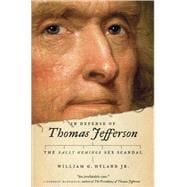
Note: Supplemental materials are not guaranteed with Rental or Used book purchases.
Purchase Benefits
What is included with this book?
William G. Hyland Jr., a native of Virginia, received his B.A. from the University of Alabama and a J.D. from Samford University’s Cumberland School of Law. A former prosecutor, Hyland is a trial lawyer with over twenty-six years of litigation experience. His publications have appeared in the law journals of the University of Texas and University of Richmond, as well as in the American Journal of Trial Advocacy, including his article, “A Civil Action: Hemings v. Jefferson.” Before law school, he worked with a Top Secret security clearance for the Arms Control and Disarmament Agency in Washington, D.C. Hyland serves on Florida’s Judicial Nominating Commission and is a member of the Virginia and New York Historical Societies. He now lives and writes in Tampa Bay, Florida.
| List of Witnesses | p. ix |
| Preface | p. xv |
| Introduction | p. 1 |
| James Callender: "Human Nature in a Hideous Form" | p. 9 |
| Misleading DNA | p. 16 |
| Sally Hemings and Randolph Jefferson: "The Unknown Brother" | p. 23 |
| "An American in Paris" | p. 37 |
| Timing and Conception | p. 46 |
| Carr Brothers and Other Male Jeffersons | p. 56 |
| Jefferson's Declining Health | p. 61 |
| The Scholars Commission and the Character Issue | p. 76 |
| Madison Hemings: Gossip and Hearsay | p. 88 |
| Jefferson on Trial | p. 94 |
| Secret Rooms and Other Hollywood Fantasies | p. 110 |
| The Monticello Report: A "Rush to Judgment" | p. 119 |
| The Charlottesville Connection: True Believers | p. 128 |
| The "Sally" Books | p. 144 |
| Jefferson Under Siege: "Presentism" | p. 156 |
| Final Argument: An Innocent Man | p. 162 |
| Acknowledgments | p. 173 |
| Appendices | p. 175 |
| Jefferson-Hemings Timeline | p. 175 |
| Minority Report | p. 178 |
| Reply to Thomas Jefferson Foundation Response to the Minority Report to the DNA Study Committee | p. 186 |
| Randolph Jefferson's Will | p. 195 |
| Mr. Jefferson's Will | p. 197 |
| "The Family Denial" | p. 201 |
| Appendix B: Opinions of Scientists Consulted | p. 208 |
| Rebuttal of the John Hartwell Cocke Letters | p. 211 |
| Endnotes | p. 215 |
| Bibliography | p. 259 |
| Index | p. 279 |
| Table of Contents provided by Ingram. All Rights Reserved. |
The New copy of this book will include any supplemental materials advertised. Please check the title of the book to determine if it should include any access cards, study guides, lab manuals, CDs, etc.
The Used, Rental and eBook copies of this book are not guaranteed to include any supplemental materials. Typically, only the book itself is included. This is true even if the title states it includes any access cards, study guides, lab manuals, CDs, etc.